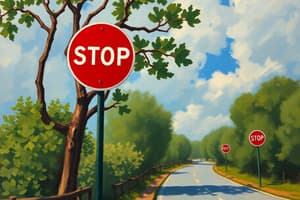Podcast
Questions and Answers
What does a green light mean?
What does a green light mean?
- Slow down
- Go, you have the right of way (correct)
- Stop
- Yield
What does a yellow light mean?
What does a yellow light mean?
- Stop
- Slow, right of way is ending (correct)
- Yield
- Go
What does a red light mean?
What does a red light mean?
- Yield
- Stop, you may not enter an intersection (correct)
- Go, you have the right of way
- Proceed with caution
What does a red flashing light mean?
What does a red flashing light mean?
What does a yellow flashing light mean?
What does a yellow flashing light mean?
If you are approaching a red light or stop sign when should you stop?
If you are approaching a red light or stop sign when should you stop?
What do you do if there is no stop line?
What do you do if there is no stop line?
What do you do if there is no crosswalk?
What do you do if there is no crosswalk?
What does a yield sign indicate?
What does a yield sign indicate?
If you are approaching a yield sign, should a vehicle approaching from another direction have to stop?
If you are approaching a yield sign, should a vehicle approaching from another direction have to stop?
Before entering a street from an alley or driveway, you should....
Before entering a street from an alley or driveway, you should....
If you are approaching a non-operating signal, you should.....
If you are approaching a non-operating signal, you should.....
Pedestrian signals display...
Pedestrian signals display...
What do don't walk signals display?
What do don't walk signals display?
A defensive driver....
A defensive driver....
Lane markings....
Lane markings....
What do yellow lane markings do?
What do yellow lane markings do?
When can you cross a yellow line to pass another vehicle?
When can you cross a yellow line to pass another vehicle?
When can you not cross a yellow line?
When can you not cross a yellow line?
What do white lane markings do?
What do white lane markings do?
When changing lanes do so at least _____ feet before the turn.
When changing lanes do so at least _____ feet before the turn.
On a highway, a slower driver should use the _____ lane.
On a highway, a slower driver should use the _____ lane.
On a highway, a fast driver should use the _____ lane.
On a highway, a fast driver should use the _____ lane.
When changing lanes, what should you check?
When changing lanes, what should you check?
When passing other vehicles, what must you ensure?
When passing other vehicles, what must you ensure?
When are passing other vehicles prohibited?
When are passing other vehicles prohibited?
When being passed, what should you do?
When being passed, what should you do?
To turn left, be in the _____ lane.
To turn left, be in the _____ lane.
Flashcards are hidden until you start studying
Study Notes
Traffic Light Signals
- Green Light: Indicates to go; drivers have the right of way if the intersection is clear of vehicles and pedestrians.
- Yellow Light: Signals to slow down; indicates that the right of way is ending.
- Red Light: Requires a complete stop; entry into the intersection is prohibited until the light changes to green and the intersection is clear.
- Red Flashing Light: Functions as a stop sign; drivers must stop and yield as necessary.
- Yellow Flashing Light: Warns to slow down and proceed with caution; cross traffic must yield.
Stopping Guidelines
- Stopping at Traffic Signals: Stop at the solid white stop line or parallel to the stop sign.
- No Stop Line: If absent, stop before the crosswalk on your side of the intersection.
- No Crosswalk: If no crosswalk is present, stop before entering the intersection.
Yield Sign Rules
- Yield Sign: Requires drivers to slow down and prepare to stop for vehicles or pedestrians with the right of way.
- Approaching a Yield: Vehicles from another direction are not required to stop.
Intersection Protocols
- Entering from Alley or Driveway: Stop and yield right of way to oncoming traffic.
- Non-Operating Signal: Stop before the intersection and yield to cross traffic, then proceed cautiously.
Pedestrian Signals
- Walk Signal: Indicates safe crossing for pedestrians.
- Don’t Walk Signal: Displays a raised hand, indicating it is unsafe to cross.
Defensive Driving
- Defensive Driver: Actively anticipates actions of other drivers to prevent potential problems.
Lane Markings
- Lane Markings: Show safe passing zones and separate traffic.
- Yellow Lane Markings: Separate opposing traffic directions.
- Crossing Yellow Lines: Allowed when there is a broken yellow line; prohibited with a solid yellow line.
- White Lane Markings: Separate lanes of traffic moving in the same direction.
Lane Changes and Passing
- Changing Lanes: Signal lane changes 200 feet in advance; check mirrors and blind spots; ensure there’s enough room to change lanes.
- Passing Other Vehicles: Ensure the passing lane is clear, return to your lane at least 100 feet before oncoming traffic, and use turn signals.
- Prohibited Passing: Not allowed with a solid yellow on the driver’s side, in no-passing zones, near curves, hill crests, or within proximity to intersections, railroad crossings, or bridges.
Driving Protocols
- When Being Passed: Allow other vehicles to pass safely without increasing speed.
- Turning Protocols: To turn left, position in the far left lane; guidelines for right turn pending further details.
Studying That Suits You
Use AI to generate personalized quizzes and flashcards to suit your learning preferences.




